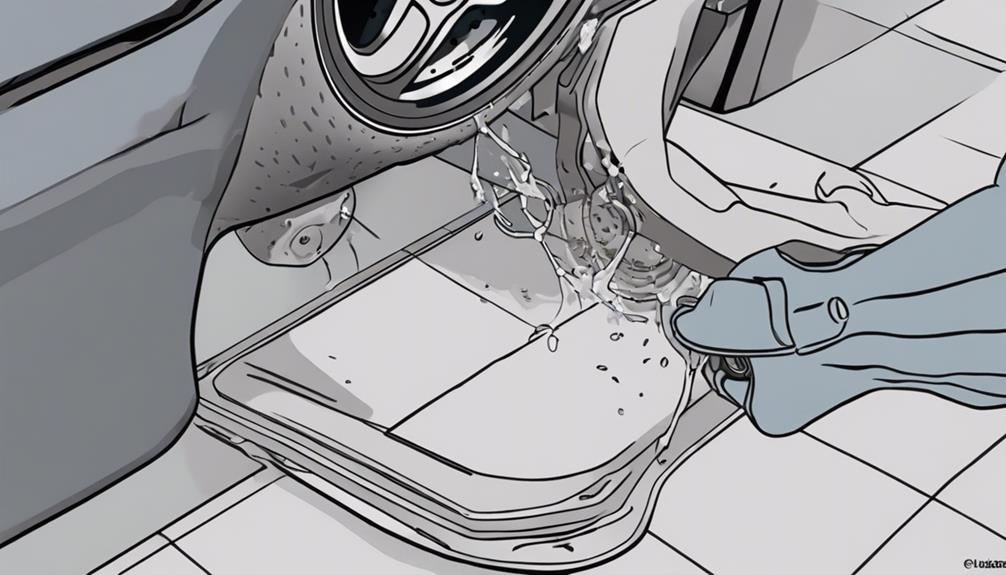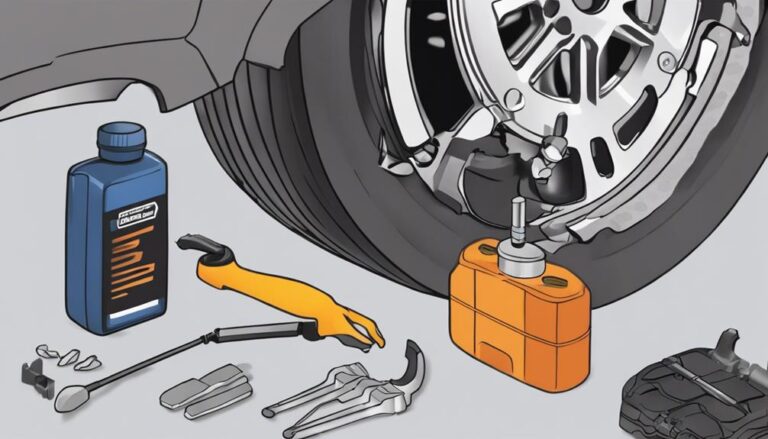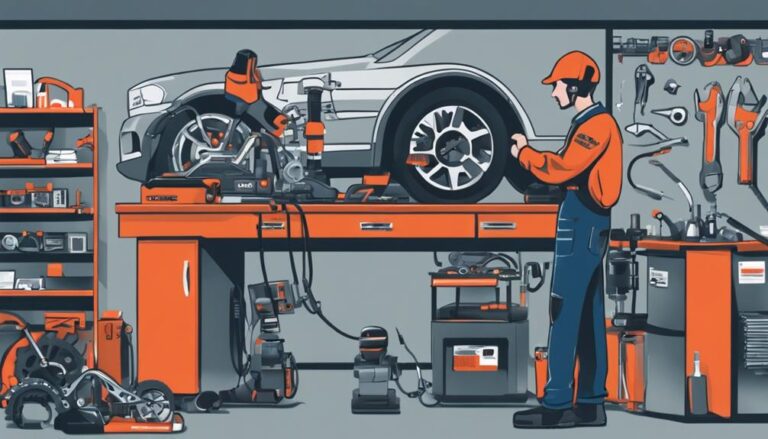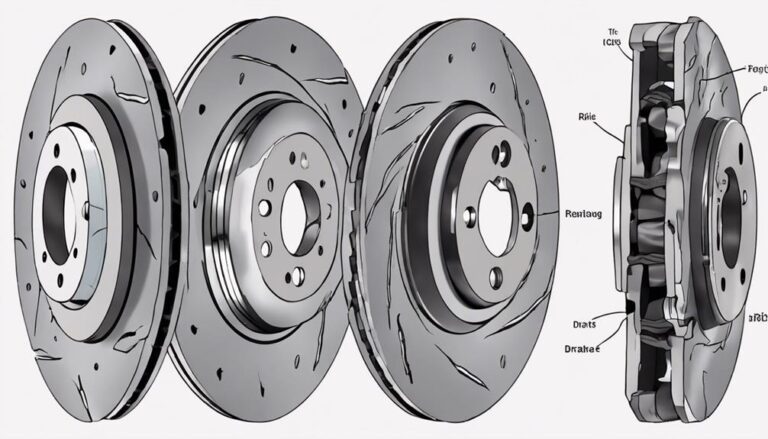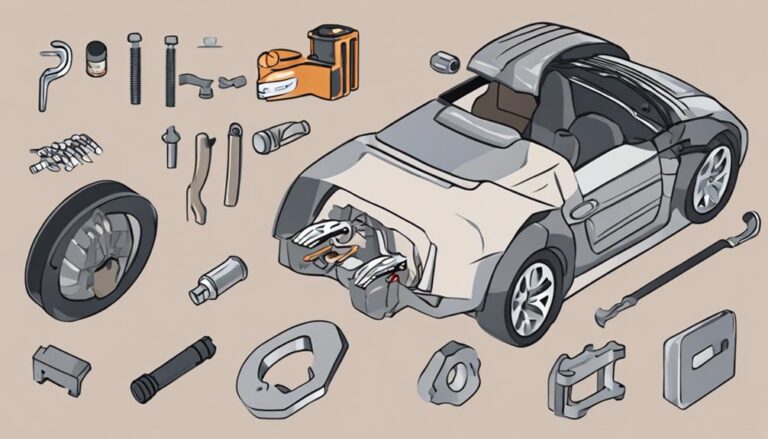What Causes a Spongy Brake Pedal?
When it comes to a spongy brake pedal, it's like peeling back the layers of an onion – there's more beneath the surface than meets the eye. Understanding the root cause of this issue is crucial in ensuring your vehicle's safety on the road.
So, let's explore the intricate web of factors that could be contributing to that unnerving mushiness under your foot as you press down on the brake pedal.
Key Takeaways
- Air infiltration in brake system reduces hydraulic pressure and causes spongy pedal feel.
- Brake line rust weakens system integrity, leading to spongy brake response.
- Leaking components like master cylinders and wheel cylinders result in spongy pedal sensation.
- Timely maintenance, inspections, and repairs are crucial to prevent spongy brake pedal issues.
Air in Brake Lines
If air infiltrates your brake lines, it compromises hydraulic pressure, resulting in a spongy brake pedal sensation. The presence of air bubbles in the brake fluid interferes with the transmission of force from the brake pedal to the brakes, leading to a soft pedal feel and diminished brake responsiveness. To rectify this issue, proper bleeding techniques must be employed to eliminate air pockets within the brake system. Bleeding the brake lines is crucial in restoring optimal hydraulic pressure and ensuring that the brakes function effectively.
Air can find its way into the brake system during repairs or when the brake fluid levels are low. When not addressed promptly, the air in the brake lines can cause a significant reduction in braking performance, compromising the safety of your vehicle. By following the correct bleeding procedures, you can effectively remove the air and restore the firmness of the brake pedal, guaranteeing that your brakes operate at their full capacity.
Damaged Brake Lines
Corrosion and rust commonly lead to small holes in brake lines, causing fluid leakage that compromises hydraulic pressure and the overall effectiveness of the braking system. To prevent spongy brake pedals, it's crucial to address damaged brake lines promptly.
Here are some key points to consider:
- Rust Prevention: Regularly inspect your brake lines for signs of rust. Rust weakens the lines and makes them susceptible to damage, leading to potential leaks. Applying rust prevention coatings can help prolong the life of your brake lines.
- Brake Line Inspection: Perform routine inspections of your brake lines to check for any signs of wear, corrosion, or damage. Look for cracks, bulges, or leaks along the lines. Timely detection of issues can prevent further damage and ensure the proper functioning of your braking system.
- Maintenance: Proper maintenance, including brake line checks, can help you avoid the hassle of dealing with spongy brake pedals. Stay proactive in maintaining your brake lines to ensure optimal performance and safety on the road.
Leaking Disc Brake Calipers
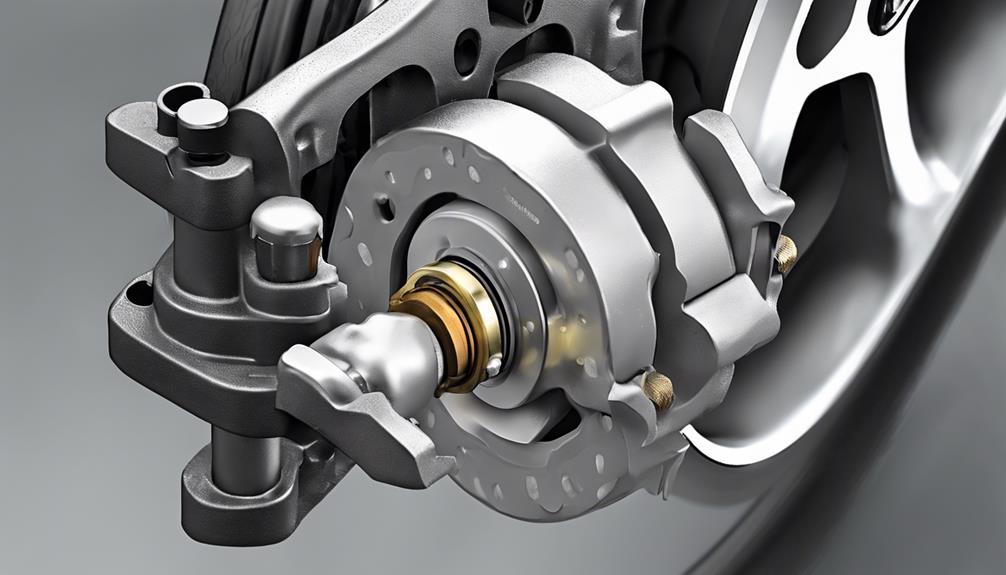
Leaking disc brake calipers pose a significant risk to your vehicle's braking performance, as they can lead to reduced fluid pressure in the brake system. When internal piston seals in calipers corrode, they may develop leaks, causing fluid to escape. This corrosion weakens the caliper's structure, potentially resulting in a spongy brake pedal. To combat this issue, regular brake caliper maintenance is crucial. Inspecting for rust or damage and promptly replacing worn calipers can prevent leaks and maintain optimal braking efficiency. To help you understand better, here is a table outlining the importance of corrosion prevention and brake caliper maintenance:
| Importance of Corrosion Prevention and Brake Caliper Maintenance |
|---|
| – Regularly inspect calipers for signs of rust or corrosion. |
| – Address any leaks or damage promptly to prevent spongy brakes. |
| – Replace worn calipers to maintain proper brake system function. |
| – Corrosion prevention extends the lifespan of your brake components. |
| – Proper maintenance ensures consistent brake performance. |
Worn Master Cylinder
Worn master cylinders can significantly impact your vehicle's braking performance by causing internal leaks and reducing hydraulic pressure in the brake system. When the master cylinder is worn, it can lead to issues like brake fluid loss and a spongy pedal feel, affecting the overall responsiveness of your brake pedal. Addressing this problem promptly is crucial to ensure your safety on the road.
- Internal seal wear or damage in the master cylinder can result in brake fluid loss and a spongy pedal feel.
- A worn master cylinder may allow brake fluid to bypass the piston seals, affecting the braking performance.
- Master cylinder replacement is essential to restore proper brake pedal responsiveness and maintain the efficiency of the entire brake system.
Leaking Wheel Cylinders
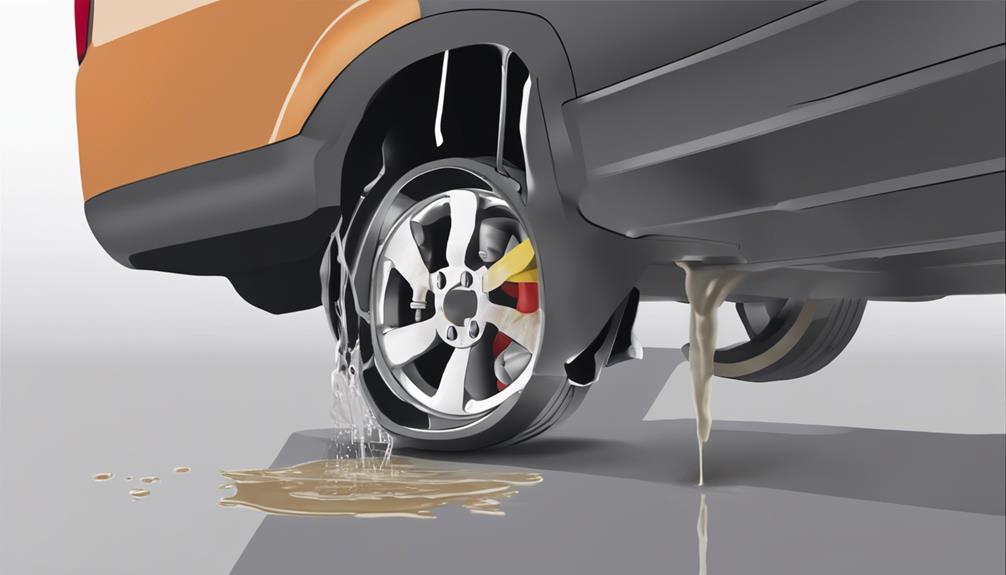
If your vehicle's braking performance is compromised, addressing leaking wheel cylinders promptly is crucial to ensure optimal hydraulic pressure in the brake system.
Leaking wheel cylinders in drum brake systems can result in reduced hydraulic pressure, leading to spongy or low brake pedal feel. Fluid leaks from wheel cylinders are often the culprit behind such issues, caused by corrosion or damage to the cylinders that allow brake fluid seepage.
When faced with spongy brakes due to leaking wheel cylinders, it's essential to consider cylinder replacement to restore proper brake function.
Regular wheel cylinder maintenance is key to preventing hydraulic pressure issues and maintaining the effectiveness of the brake system. By monitoring the condition of the wheel cylinders, you can catch leaks early and prevent further degradation of the hydraulic system.
Frequently Asked Questions
How Do You Fix a Spongy Brake Pedal?
To fix a spongy brake pedal, bleed the brake system to remove air bubbles. Ensure proper brake fluid levels and address any leaks promptly. Check the master cylinder, adjust rear brake shoes, and inspect ABS assembly for malfunctions.
Can a Bad Brake Booster Cause a Spongy Pedal?
When your brake booster malfunctions, troubleshoot for poor responsiveness. Adjust driving techniques to compensate for potential sponginess. Promptly address issues to ensure safety and proper brake function, avoiding longer brake pedal travel before engagement.
Will Spongy Brakes Fix Themselves?
Spongy brakes will not fix themselves. Addressing the issue promptly is crucial to ensure safety. Air or fluid leaks in the hydraulic system cause this. Ignoring it may lead to accidents. Seek maintenance for brake fluid contamination.
Why Are My Brakes Still Spongy After Bleeding?
If your brakes feel spongy after bleeding, lingering air bubbles in the brake fluid may be the culprit. Check for improper bleeding techniques or worn components. Ensure a thorough bleed to eliminate air pockets for optimal braking performance.
Conclusion
In conclusion, a spongy brake pedal is often caused by air in the brake lines, damaged brake lines, leaking calipers, a worn master cylinder, or leaking wheel cylinders.
Remember, 'An ounce of prevention is worth a pound of cure.' Regular maintenance and prompt repairs are crucial to ensuring your brake system operates efficiently and safely.
Don't ignore spongy brakes – address the issue promptly to avoid potential accidents on the road.

